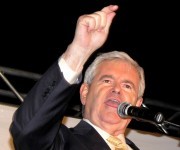dimwittery
-
What's behind Newt Gingrich's proposal to abolish the EPA?
Everyone on the internets is busy mocking Newt Gingrich's call to abolish the EPA. And that is as it should be -- I would never ask anyone to stop mocking Newt Gingrich. Rarely has the universe mixed pomposity and dimwittery into such an exquisitely mockworthy package. I do want to note, however, that what Gingrich is trying to pull off is not just old-fashioned Republican-style "leave corporate polluters alooooone!" Don't get me wrong: Newt wants to remove constraints on polluters! But he knows (unlike his buddies in Congress) that such a baldly retrograde position will not be popular with the public, which actually likes clean air. So he needs some kind of alternative. That's why he's proposing to replace the EPA with something called the Environmental Solutions Agency.
-
Americans don't know jack about saving energy
A new survey quizzed people on what steps make the biggest difference in saving energy and found loads of confusion.
-
Another pathetic day in the U.S. Senate
Today was an important day for the energy bill. Sort of. The entire Democratic Senate caucus met to discuss how to move forward on climate and energy. Kerry, Bingaman, and Cantwell all presented — and argued for — their respective bills. (They made videos, too — Kerry’s; Cantwell’s.) The intent was to make some kind […]
-
Global weirding, East Coast snow storms, and Vancouver’s snow shortage
The other day someone made the cleverest quip: “Hey Al Gore, how do you like your global warming now that it’s snowing and snow is cold, Al Gore?” If only someone had made such a comment on the internet, or possibly Twitter; then I could link to it. Do such comments deserve serious responses? No. […]
-
US Chamber of Commerce calls for ‘Scopes Monkey Trial’ on climate change
Cross-posted from Wonk Room. The U.S. Chamber of Commerce — the 97-year-old organization that bills itself as the “voice of business” — wants to put climate science on trial. As the Environmental Protection Agency nears a final ruling that manmade global warming endangers the public health and welfare, “the chamber will tell the EPA in […]
-
In the face of all evidence, some folks just can't see green as anything but a cost
It's always difficult to write (non-boring) posts on conferences. People come on stage, discuss wonky issues, and leave. There's rarely any "news." If people really wanted to hear my running commentary, they would do what With-It People do and follow my tweets.
So, just a broad observation on today's events. One of the earliest sessions of the day was Bjorn Lomborg, delivering his increasingly ridiculous message that we have to prioritize social spending (banal) and that spending to avert climate change just doesn't pass the cost-benefit analysis test (absurd).
Underlying Lomborg's nonsense is an assumption so common (in some circles) that it scarcely seems worth stating explicitly, much less defending: that reducing emissions is all about immediate economic costs and nebulous, distant social benefits. The question is always, do the nebulous distant benefits justify the immediate economic costs?
This mindset informed virtually all the questions the moderators asked (with the exception of Jeffrey Ball, who's very sharp). With every business or policy proposal, it was, what about the cost? Will people pay the cost? Can we afford the cost during a recession? The one-track-mindedness reached comic proportions a few times. Right after Lomborg, architect William McDonough came out, told a few stories of saving companies millions of dollars, then built his way in a poetic reverie on buildings that could be like trees, fecund and regenerative. WSJ's Kimberly Strassel paused, and then, I kid you not: "But what about the cost?"
Jaybus. I mean, A, how about having more than one thought, and B, he just told you he saved these companies millions of dollars. S-A-V-E-D. That like ... un-cost.
When WSJ's Alan Murray was interviewing Amory Lovins, he just kept repeating incredulously, "but what about the trade-offs?" "Trade-off" is code for the notion that any environmental improvement comes at economic expense. Lovins, meanwhile, was talking about building super-efficient buildings at under average cost. He was repeating, as he has so many times, that saving energy (and cutting emissions) is cheaper than buying it.
I don't know why people who were cheerleaders for an utterly pointless $3 trillion war and hundreds of billions of dollars of Wall Street bailouts suddenly become obsessive-compulsive bean counters when it comes to, oh, improving public health or saving our grandchildren from untold misery, but if you're going to count the beans, count the fracking beans.
This is the second year I've been at this conference. CEO after CEO talks about making big investments and getting even bigger returns. I have not seen or met a single businessperson who has done this stuff and says anything but, "I'm glad we did it, it paid off bigger than we thought it would, it energized my employees, it absolutely makes business sense." The only people I've seen say anything negative about greening efforts are people like Michael Morris who have resisted making them.
Why, in the face of this torrent of evidence, do some folks fail to see the profitable emission reduction strategies in front of them? Lovins later asked Gore, somewhat plaintively, "how can we change the conversation from sacrifices and costs to opportunities, jobs, and savings?"
I wish I knew. It's a peculiar sort of malady, like color blindness or something.
-
Eight more environmental Bushisms
 George W. Bush is, by far, the greatest mistake ever made by the American people -- or was that by Gore for running such an inadequate campaign, or by Ralph Nader for running at all or at least by one idiot in South Florida who designed the butterfly ballot, or by the Supreme Court (Note to self: let it go, let it go, let it go, on this day of all days).
George W. Bush is, by far, the greatest mistake ever made by the American people -- or was that by Gore for running such an inadequate campaign, or by Ralph Nader for running at all or at least by one idiot in South Florida who designed the butterfly ballot, or by the Supreme Court (Note to self: let it go, let it go, let it go, on this day of all days).It is amusing to read the delusionary op-eds of conservatives who think Bush's legacy will be determined by Iraq, and therefore Bush will be vindicated and rehabilitated by history. Not!
Even if we could forget Katrina, torture, Guantánamo, Abu Ghraib, and the worst economy since the great depression, his legacy, with a near-absolute certainty, will be set by his policy of wanton climate destruction (see "the Worst President in American History") -- unless, of course, Barack Obama can somehow put us on a truly sustainable path, but that rejection of everything Bush stood for will hardly rehabilitate W. Quite the reverse.
Anyway, the real point of this final post on Bush -- final at least until the media or the Obama team uncover yet another unbelievable environmentally destructive thing he did that we are as yet unaware of -- is to share a list of eight environmental Bushisms I just found to make my list of the top 25 Bushisms of all time complete:
-
Marc Morano agrees that only experts in climate feedbacks can make judgments on climate
Tuesday, I received an email from Marc Marano, staffer for Sen. James Inhofe (R-Okla.). Usually, these are vectored straight into my junk folder, but apparently my computer's spam filter has a sense of humor, because this email made it into my inbox. And what I saw astounded me.
Marc's email contained a link to a recent post by Roy Spencer. In it, Spencer claims:
Obviously, the thermostat (feedback) issue is the most critical one that determines whether manmade global warming will be catastrophic or benign. In this context, it is critical for the public and politicians to understand that the vast majority of climate researchers do not work on feedbacks.
In popular political parlance, most climate researchers do not appreciate the nuanced details of how one estimates feedbacks in nature, and therefore they are not qualified to pass judgment on this issue. Therefore, any claims about how many thousands of scientists agree with the IPCC's official position on global warming are meaningless.Did I read that right? The only people qualified to make judgments on the science of climate change are experts in climate feedbacks?
I'll ignore the questionable and obviously self-serving nature of this claim for now. The surprising point here is that Roy has clearly disqualified virtually every member of Inhofe's list of 650 "experts" who dismiss the IPCC's view of climate science. Not only are the Inhofe 650 members not experts on climate feedbacks, but also most of them are not experts on any aspect of the climate. (Note, however, that I'm still an expert because I actually do work on climate feedbacks.)
And since Marc Moreno sent out a link to this post, he obviously agrees that Inhofe's list is a pile of rubbish.
Finally, something Marc and I can agree on.
-
The right-wing caricature of environmentalism inhibits action on matters of human welfare
Recommended: "Earth Worship," an article from the latest issue of the Southern Poverty Law Center’s Intelligence Report. It offers a window into environmentalism as seen feverishly imagined by the far right. It begins: Addison, Texas — "Environment is not about saving nature," the founder of Freedom Advocates, Michael Shaw, sternly warned an audience of antigovernment […]




